This article has been medically reviewed by Rachel Fitz-Desorgher a specialist midwife, infant feeding consultant and parenting consultant.
If you've watched your due date come and go or you're just so damn uncomfortable, you might have started exploring ways to bring on labour naturally, one of which includes drinking raspberry leaf tea. This is a herbal remedy that is thought to tone the muscles of your womb to help it work during labour.
What is raspberry leaf tea?
Red raspberry leaf tea is a herbal tea that is made from the leaves of the red raspberry plant. It has been used as a pregnancy tea for at least two centuries. Although often recommended to induce labour, its actual role is to increase blood flow to the uterus and ready the uterine muscle for more organised contractions during labour.
While there are no studies to suggest that this fruity herbal tea can induce labour, by learning how it works with the womb, it's understandable why so many pregnant women are keen to try the tea.
Why do pregnant women drink raspberry leaf tea?
“Raspberry leaf tea is used by many women to help prepare their womb muscles for labour and birth,” says Rachel Fitz-Desorgher, author and former midwife. “The womb muscle contracts regularly day in and day out even when a woman is not pregnant, which is how it keeps toned and fit. As the womb gets ready for the mammoth effort required for labour and birth, the exercise it does picks up, just like a runner preparing for a marathon."
“Raspberry leaf tea is also thought to help the womb muscle tone up. Although there is no evidence, by getting really toned up and ready for action in this way, a woman might be less likely to go past 41 weeks of pregnancy. So although the tea doesn't really start labour, it might help push your body in the right direction by getting the womb fit and strong.”
Benefits of raspberry leaf tea
Although the chance of raspberry leaf tea kick starting labour is still up for debate, on the whole, there are plenty of other possible health benefits to drinking a cup including:
• Helping to induce labour. Some studies have also indicated that it can also help shorten the length of the second stage of labour.
• Strengthening the uterus as studies have found it can help blood flow to the uterus and aid muscle contractions.
• Possibly prevents tears and interventions during birth. According to some research, drinking raspberry leaf tea in the later stages of pregnancy may reduce the likelihood of interventions in labour, for example, with the use of forceps.
• It is rich in oxidants and nutrients such as calcium, iron, potassium and vitamins A,C and E which protect against chronic disease and inflammation.
• May ease premenstrual symptoms including cramps, vomiting, nausea and diarrhoea.
Sandra Greenbank, a nutritional therapist specialising in fertility, pregnancy and women's health says: “Raspberry leaf has been famous throughout history for preparing mothers for childbirth. It is thought to help shorten labour, as it strengthens the uterine and pelvic muscles while also working as a relaxant at the same time, and therefore helps reduce the pain of contractions during labour."
Does raspberry leaf tea work?
Although no trials regarding red raspberry leaves and drinking red raspberry leaf tea as a pain management therapy during labour have been published, a few studies have looked at how this fruit tea affects labour and birth outcomes.
For example, studies evaluating the length of labour and birth outcomes found that the use of raspberry leaf tea can shorten the second stage of labour and reduce post-term pregnancy.
Although some mamas swear by it, ultimately, there isn't enough evidence either way to provide a comprehensive answer.
Raspberry leaf tea dosage
There are no official guidelines around how much raspberry leaf tea you should drink, but it is advised not to drink it in early pregnancy, or before 36 weeks pregnant. As a general guide, start with 1 cup a day and increase to no more than 3 cups per day by 39 weeks. If you don't like the taste and prefer to take raspberry leaf tablets, follow the guidelines with the tablets, which is normally one tablet per day, increasing to 2 tablets per day at 39 weeks. If you have any questions or concerns it is always best to check with your midwife or doctor.
When to start drinking raspberry leaf tea
It’s important to make sure you wait until the recommended date before you start drinking this tea. “The general advice is to wait until around 36 weeks pregnant to start drinking the tea, or take the capsule alternative. This is because there is a worry about its impact in pregnancy,” says Laura Southern, a nutritional therapist from London Gynaecology.
You should start with one cup a day and build up to three cups a day, to help bring on labour naturally.
Is it safe to drink raspberry leaf tea?
Considering raspberry leaf tea is easy to get hold of, you might be mistaken for thinking that it must be safe to drink. However, some medical herbalists caution that you should be careful taking it early in pregnancy, as it stimulates the uterus and could cause a miscarriage, although there are no studies on this.
You should be careful if you are taking other medicines before drinking raspberry leaf tea because, like all herbal remedies, it can interfere with some other medicines such as those for diabetes and antidepressants and cause side effects according to the NHS.
Always check the leaflet that comes with the tea or tablets if you buy it over the counter or, better still, talk to your midwife beforehand.
Are there any side effects to drinking raspberry tea?
Due to the lack of research on raspberry tea in pregnancy, the possible side effects known are limited, however, it is believed to:
• Affect your bowels: while some users found it to have a laxative effect, others found it actually helped treat diarrhoea.
• Cause you to urinate more: Yep, even more than you usually are!
• Potentially increase the chance of miscarriage: As above, because raspberry leaf tea may have the potential to trigger labour contractions, it is wise to avoid drinking it in early pregnancy.
Who should not drink raspberry leaf tea?
It's not advised to drink raspberry leaf tea if:
• You have high blood pressure
• You are expecting twins or your baby is breech
• You have a family or personal history of breast or ovarian cancer, endometriosis or fibroids
• You've had premature labour previously
• You are breastfeeding
• If you're due to have a c-section
• If you've had any complications or health problems in your pregnancy
In general, it is best to speak to your midwife before considering drinking raspberry leaf tea to ensure that you personally aren't at risk.
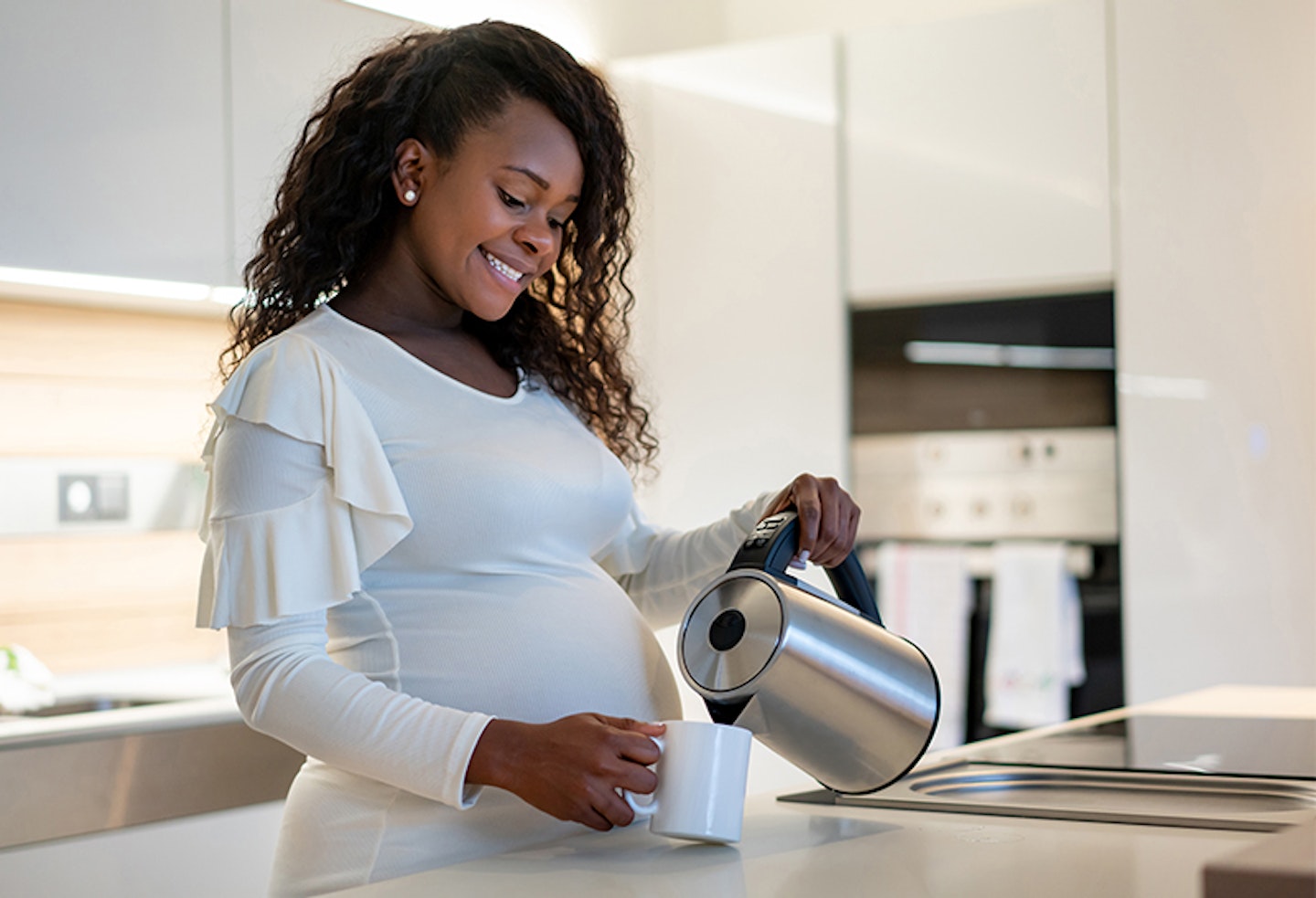
Best raspberry leaf tea at a glance:
• Best pure raspberry leaf tea: Indigo Herbs Raspberry Leaf Tea, £8.45 on Amazon
• Best raspberry leaf tea for flavour: HotTea Mama | The Final Push,£5.40 on Amazon
• Best loose leaf raspberry leaf tea: Origeens Organic raspberry leaf tea £13.97 on Amazon
• Best organic raspberry leaf tea: Yogi tea raspberry leaf, £5.05 on iHerb
• Best raspberry leaf capsules: Nature's Aid Raspberry leaf tablets£5.19 on Amazon
Where to buy raspberry leaf tea
Once you have confirmed with your midwife that it is safe for you to begin drinking this tea, here are some raspberry leaf teas and capsules to try.
Best pure raspberry leaf tea
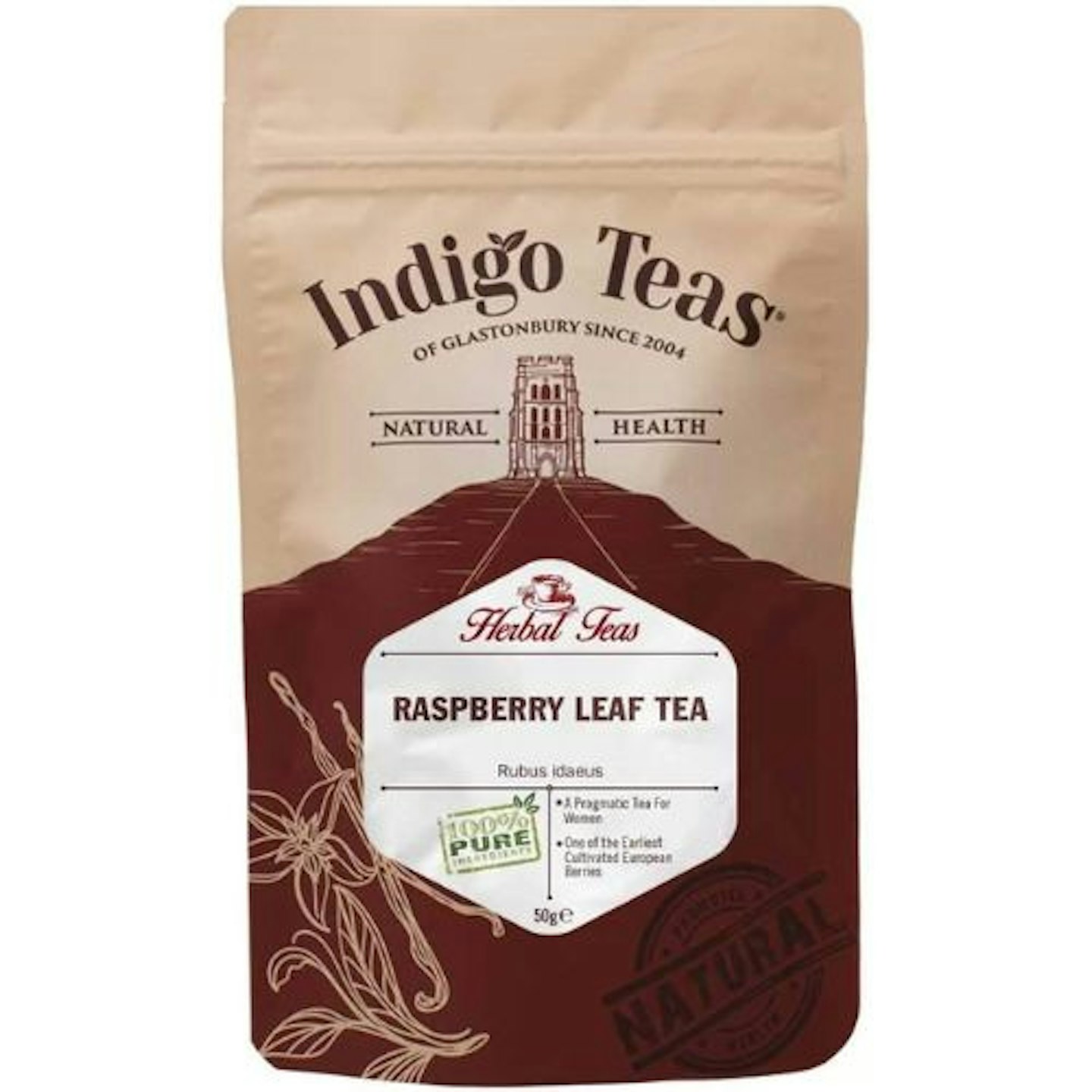 Amazon
AmazonIndigo Herbs raspberry leaf herbal tea is made from 100 per cent pure botanical ingredients with no additives or nasties. One customer who was struggling to find a raspberry leaf tea that was just 100 per cent raspberry leaf tea and not an infusion was really glad to have found this one. They said it's a great price and arrived quickly. "The tea tastes lovely (very earthy) and comes in a handy resealable packet which keeps the tea from deteriorating. I bought this tea to drink during the last few weeks of pregnancy but will continue to drink it after."
Some people find loose leaf tea to be a hassle, but Indigo Herbs say they have a stronger flavour with fresher ingredients. Their products are packed into resealable airtight foil pouches to keep your tea fresher for longer and free from any contaminants. Another reviewer said, "I've tried quite a few different varieties but this is definitely one of the nicest, with a reasonable amount of strength. Would recommend."
Indigo Herbs recommends warming your teapot with a little boiling water before adding the loose herbs. Add as much as you want according to your own taste and how strong you want your tea to be. This may take a bit of trial and error until you learn what you like. Then immediately pour over boiling hot water and put the lid on. Cover the pot with a tea cosy or tower to keep the heat in while the tea leaves steep. You can achieve a strong flavour by brewing for 1-15 minutes, providing a good variety of strengths to suit your personal tastes. Add a little bit of honey to sweeten the fruity black-tea-like flavour, and feel free to enjoy it cold in warm weather, it tastes just as good! Others seem to love this brand for its flavour and quality, and only wish it was sold in larger bags.
Pros
- The tea contains no additives or nasties
- You can achieve a strong flavour
- Comes in a resealable airtight foil pouch to keep leaves fresh and uncontaminated
Cons
- Loose leaf so strainer needed
- Don't sell larger bags
Best raspberry leaf tea for flavour
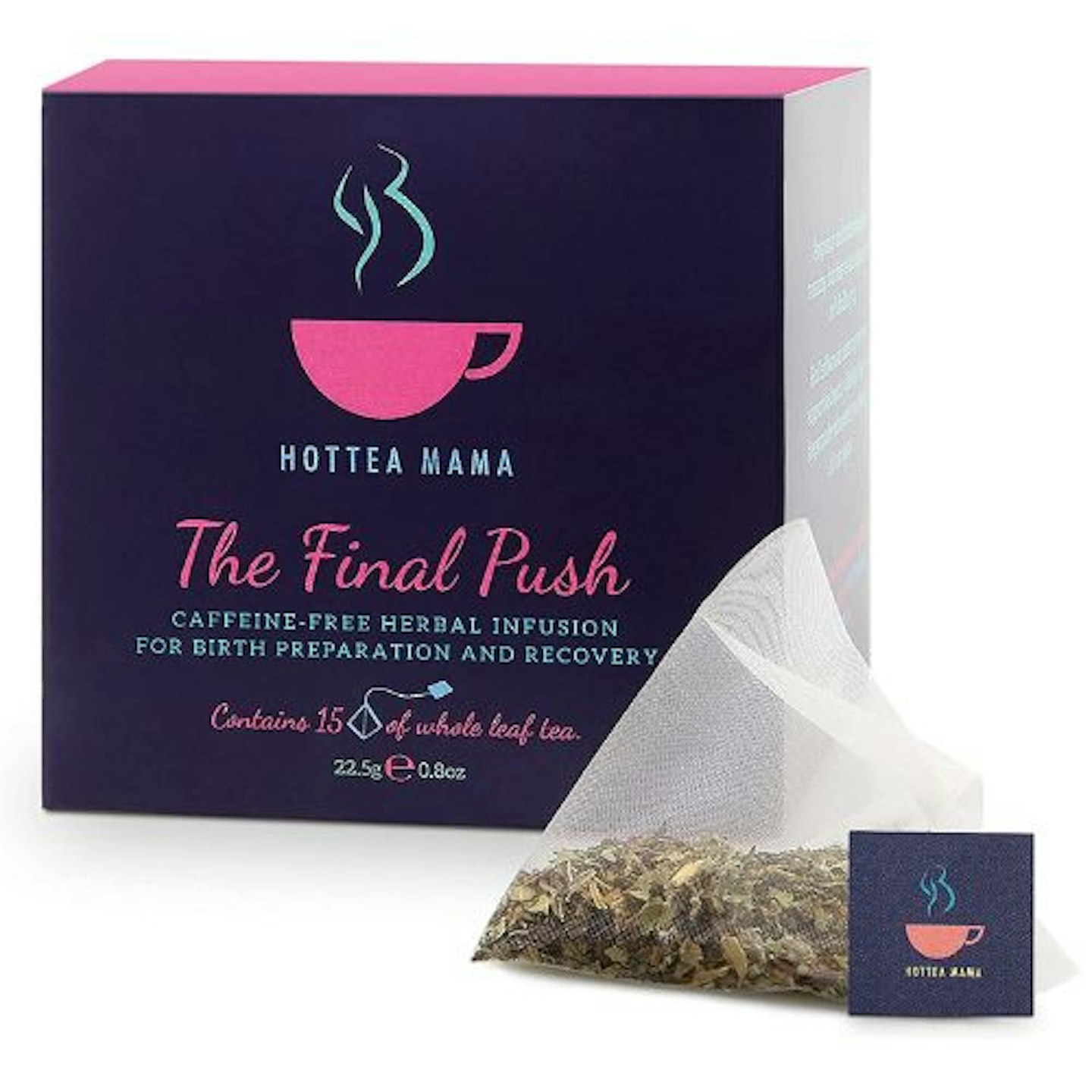 Amazon
AmazonIf you're not so keen on the flavour of raspberry leaf tea but want to enjoy the labour-inducing effects, you can get this caffeine-free version that has peppermint as well. It can be taken from 32 weeks and is linked in studies to a shorter second stage of labour, according to HotTea Mama. It also claims to aid recovery after labour, helping to combat heartburn.
Bernice applauded HotTea for her speedy labour: "I was 37 weeks pregnant when I started drinking this tea, and induced at 38 weeks. The nurse and Doc was very surprised that in a few hours I would go into labour so fast. I recommend this tea for women who want to give birth very fast"
It is made from 100 per cent natural ingredients with no flavourings or additives - just raspberry leaf and whole peppermint leaves. The packaging is eco-friendly and made without plastic or glue. The plant-based teabags are fully biodegradable too, made from cornstarch. So you'll be supported by the planet as well as your pregnancy.
Customers seem to like this tea overall, saying it tastes great and has a subtle hint of mint. Others found the teabag a bit weak. One customer said, "This tea is SO GOOD! The mix of a little peppermint with it is really refreshing and I really hope it helps make labour even slightly easier! (First time momma so I'm very nervous) The only downside is that the bags aren't the strongest so most of the contents ends up at the bottom of my cup, making it nearly impossible to use the bag twice as directed." If you prefer very strong flavours you might be better off trying loose leaf tea with an infuser instead of teabags.
Pros
- 100% natural & organic including raspberry leaf and whole peppermint leaf
- It can be consumed from week 32 of pregnancy onwards
- The tea is totally caffeine-free, which is perfect when you're pregnant
- Plastic-free (no micro-plastics) and biodegradable packaging
- Helps combat late pregnancy heartburn
Cons
- Some mums found the tea was a bit weak
- The teabags can release leaves into your cup
Best loose leaf raspberry leaf tea
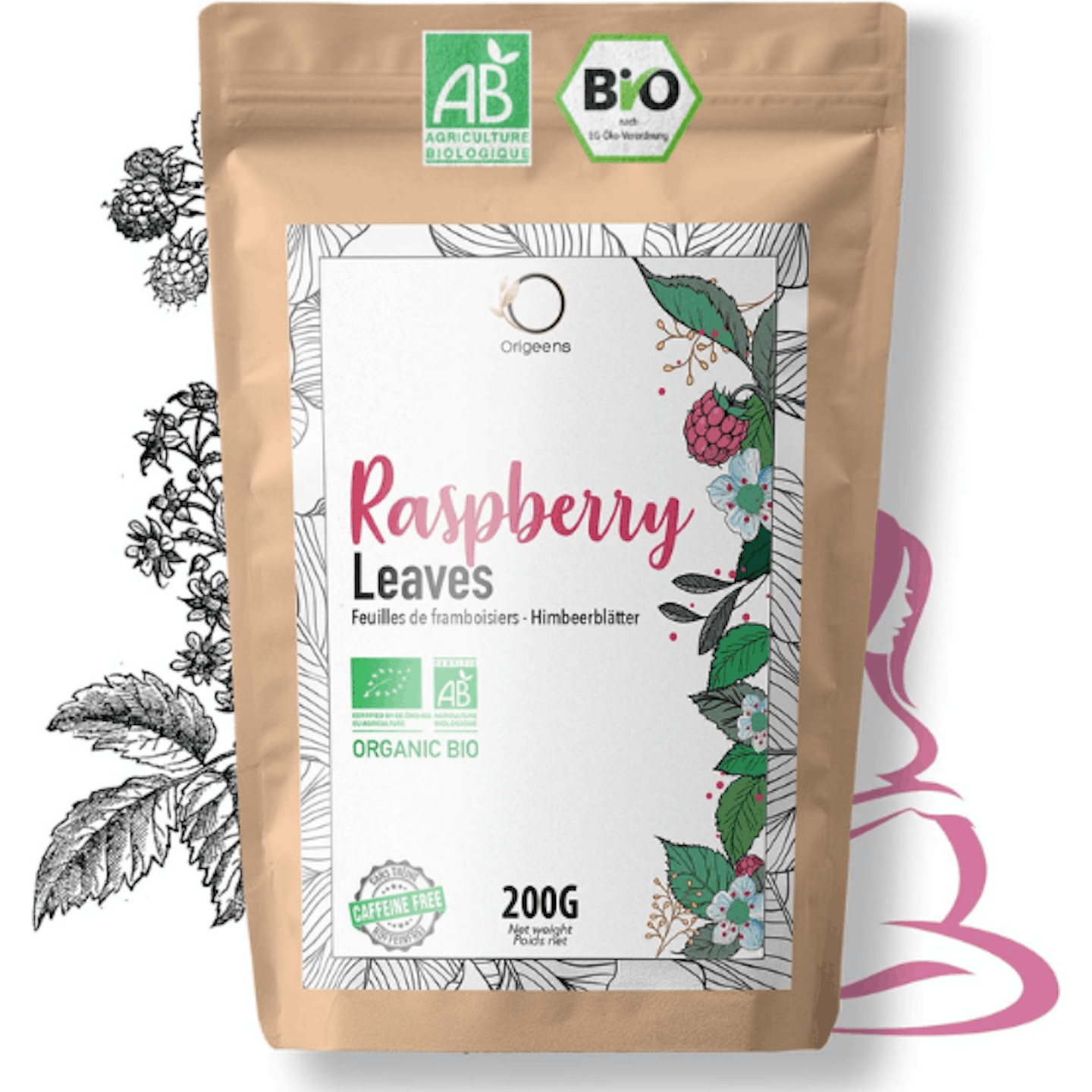 Amazon
AmazonORIGEENS aims to develop sustainable, quality products, and they state that they are guided by the pleasure of the senses and the search for balance in the mouth: 'we create drinks for moments of wellness that matter, every day.' If you prefer to brew your tea from loose leaves in a teapot, this is a great option. You may be surprised that raspberry tea doesn't necessarily taste like raspberries. People often mention in reviews that they thought the taste was bitter. However, raspberry leaf tea is supposed to have a mildly bitter taste, similer to black tea, so you may enjoy it more with your chosen sweetener - lemon, honey and ginger work well.
One reviewer said, ""I was expecting it to taste strong and sweet like the t-bags I’d tried during my previous pregnancy. But this is more of a green tea sort of taste, I added honey and it’s really enjoyable. I’d suggest a tea strainer if you don’t like the floaters but I personally don’t mind them. Great value for money." Another customer who didn't know what to expect when purchasing this tea had always bought from supermarkets and found them to be too sweet and unnatural-tasting. They discovered that those only contain a small percentage of raspberry leaf, so they were pleasantly surprised by ORIGEENS Organic Raspberry Leaf Tea, which they described as, "100% nicer than the strong sweet raspberry flavour of supermarket tea" and said they would definitely recommend it.
Pros
- 100% organic - these raspberry leaves are certified from organic farming
- Rich in vitamins and minerals
- Fragine is an active ingredient which acts as a stimulant for the muscles of the uterus, without impacting the cervix
- Can help digestion after birth
Cons
- More of a bitter, green tea taste so may need to add some honey
Best organic raspberry leaf tea
 Amazon
AmazonYogi Tea is a well-known organic tea brand that combines the finest spices and botanicals from around the globe to support your health and wellbeing. This blend of Raspberry Leaves, Lemon Verbena and Lavender Flowers is naturally caffeine free, and you get 102 teabags in total.
While this isn't a pure raspberry leaf tea, the other ingredients are all 100% natural with added health benefits, adding to the flavour as well. Other ingredients include: liquorice, cinnamon, lemon balm, ginger, thyme, oregano, cardamom, black pepper cloves. It's a good idea to check and see if any of these ingredients put you off as some of them may be an acquired taste, as one reviewer said, "I didn’t enjoy the taste nor the aroma."
Pros
- Support your female cycle
- Free from flavours or additives
- Yogic wisdom on each tea tag and a yoga exercise on each pack
Cons
- Not a pure raspberry leaf tea
- Different flavour due to all the extra natural ingredients
Best concentrated raspberry leaf tablets
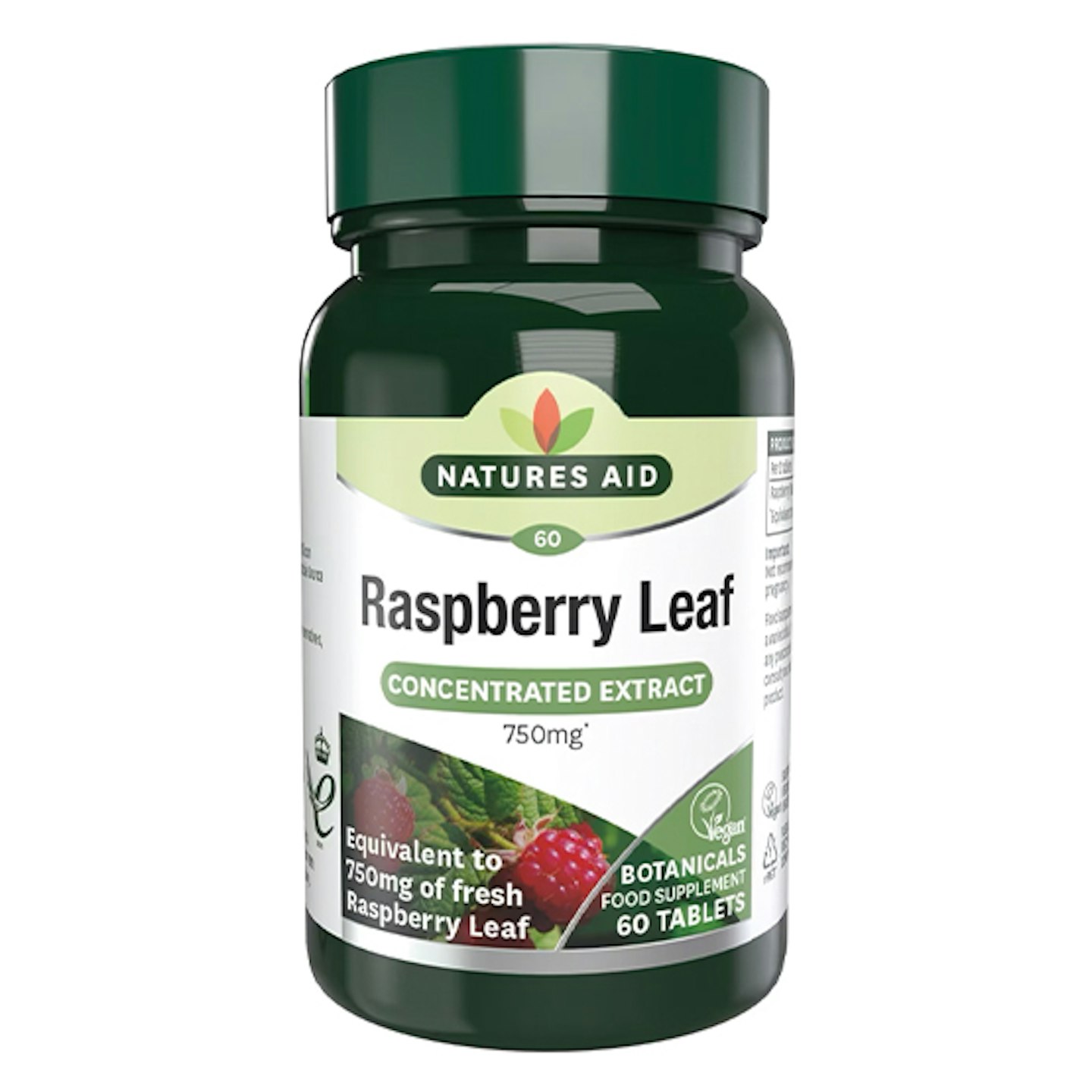 Holland & Barrett
Holland & BarrettNatures Aid are experts in Natural Health and have been manufacturing and supplying high-quality nutritional supplements in Britain for nearly four decades. They say 'Since 1981, we’ve dedicated ourselves to improving and expanding our products with the latest scientific advancements and quality ingredients. Our experience in the natural health industry, coupled with our award-winning team, has enabled us to build a range of innovative products.'
These raspberry leaf tablets are great if you don't like the taste of raspberry leaf tea but still want the benefits. Plus they are concentrated using both the berries of the raspberry bush and the leaves. Natures Aid Raspberry Leaf extract provides the equivalent to 750mg of dried Raspberry Leaf. One reviewer says they took this supplement with all three of their pregnancies and feel it definitely helps in labour. They've had two 2 hour labours and one that was less than an hour long. "It works!" They say. Another mum said, "I've been taking this tablets twice a day from week 35 I had a speedy labour my water broke at 12 am and baby was born at 12:50 highly recommended"
Many mums have left reviews that talk about how easy it is to swallow these tablets, but they also complain about the strong taste and smell. However, they like the pain relief and general performance, mentioning that it helps with postpartum recovery and is easy on the stomach.
Remember, this product should only be used during pregnancy from week 30 onwards.
Pros
- A convenient alternative for those who don't like Raspberry Leaf tea
- No fuss, just take two tablets daily with food
- Made in the UK and manufactured to the industry recognised GMP and Pharmaceutical Standards
- All products undergo rigorous quality testing
- Approved by the Vegan Society and suitable for vegetarians and vegans
Cons
- Some mums found they had a very strong taste and smell
Best pregnancy raspberry leaf tea
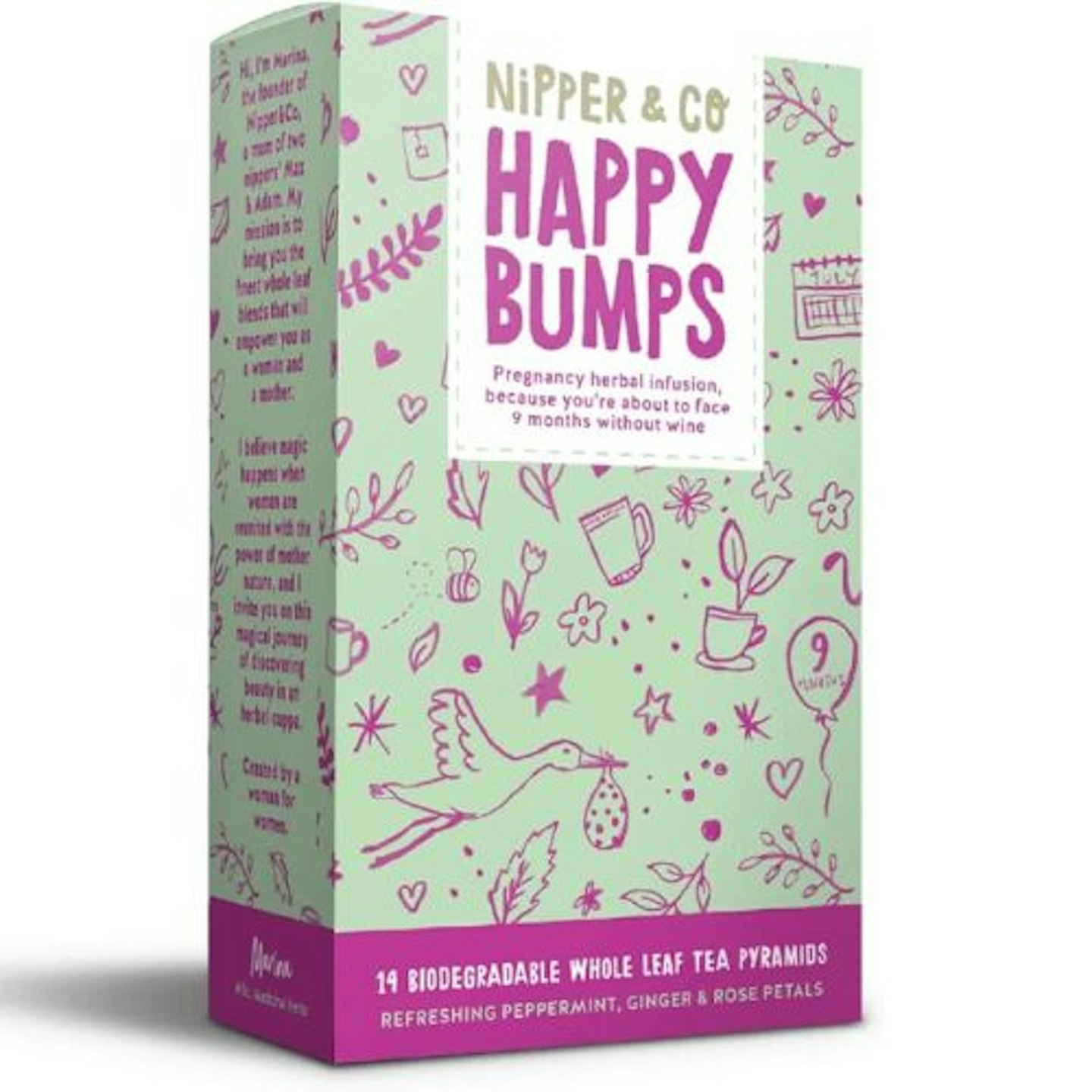 Amazon
AmazonThis refreshing Nipper Co Organic Pregnancy Tea is 100 per cent natural, free of artificial flavours or additives, flavour enhancers or colourings. It contains peppermint, spearmint, ginger, rose petals and of course raspberry tea - but only 13 per cent. One reviewer says: "I keep going back to this blend even though I am not pregnant anymore. When I was pregnant it was my favourite go to herbal tea, and one of the rare things that did not make me nauseous. Now I just enjoy it as a naturally caffeine free option whilst breastfeeding and I heard raspberry leaf is great to have postpartum as well." Another customer wrote, "This tea has a lovely fresh fragrant flavour that’s perfect for calming pregnancy nausea."
Pros
- Each bag can be reused up to 3 times
- Made for pregnancy, this would make a nice pregnancy gift
- Free from artificial flavours, with no pesticides or other nasties, and caffeine free
- Entirely biodegradable packaging from box to tea bag, every part can be recycled
Cons
- Blend of different flavours so not pure raspberry leaf
About the experts
Rachel Fitz-Desorgher
Rachel Fitz-Desorgher is a baby and parenting expert and mother’s mentor. She has four grown-up sons and two grandchildren.
Rachel worked as a specialist midwife, infant feeding consultant and parenting consultant for over 30 years before deciding to leave midwifery in order to focus her expertise and experience on mentoring women transitioning from the busy world of work to motherhood.
Laura Southern
Laura Southern is a fully certified nutritional therapist from London Gynaecology, who has worked in nutritional therapy for seven years, and she qualified at the prestigious Institute for Optimum Nutrition which is recognised as one of the leading centres for nutritional training and education.
Laura became passionate about supporting pregnant women during her own pregnancies, noticing first-hand the difference the right nutrition and supplementation plan can make. She has since treated numerous pregnant ladies with a range of pregnancy-related conditions including; endometriosis, polycystic ovaries, weight management, anaemia and gestational diabetes.
Sandra Greenbank
Sandra Greenbank is a registered nutritional therapist specialising in fertility, pregnancy and women's health.
With 12 years experience as a nutritional therapist working with clients across the UK, Europe and the US, she has helped countless women get to the root cause of their fertility issues and achieve the healthy pregnancy and baby they didn’t think was possible.
She studied for four years at the Institute of Optimum Nutrition and qualified in 2009. She's currently undergoing training at the Institute of Functional Medicine as part of her commitment to attaining the highest standards of knowledge and competence in the practice of evidence based Nutritional Therapy and Functional Medicine.
Maria Martin is Digital Group Editor for Yours.co.uk and Motherandbaby.com. She is a mum-of-two with a passion for helping women from all walks of life – from supporting breastfeeding mothers with expert advice to encouraging conversations about mental health. In her professional role, she has over 10 years' experience in the digital world, including editing articles, focussing on SEO, social media engagement, picture researching and video editing.
